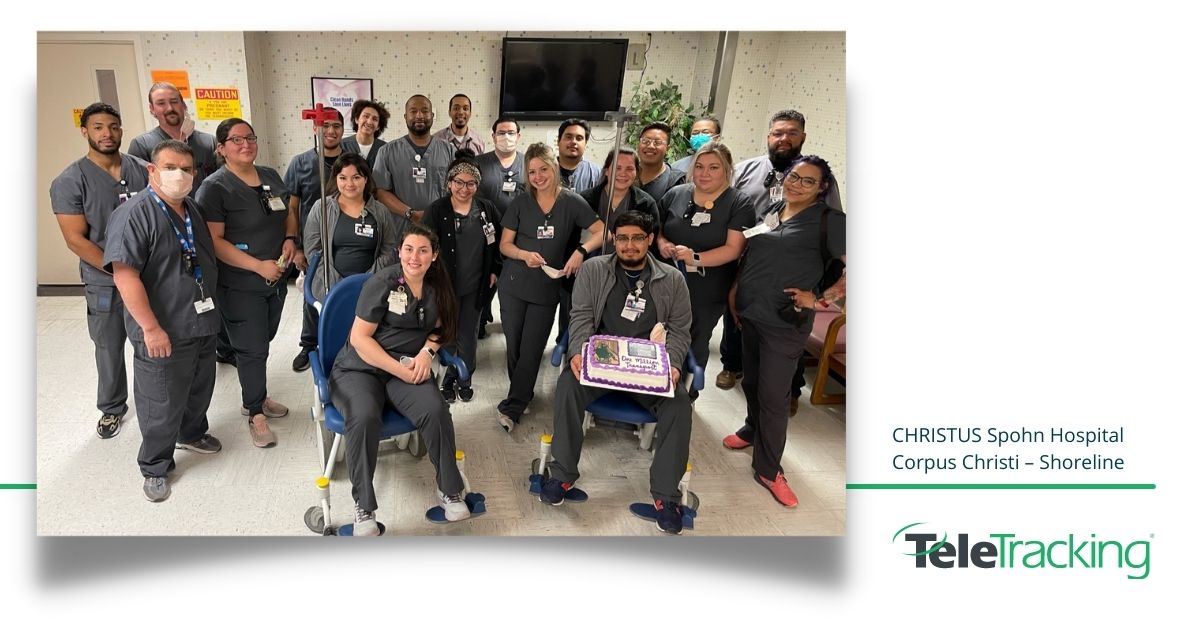CHRISTUS Health Spohn-Shoreline—Elevating Centralization and Celebrating One Million Transports
CHRISTUS Spohn Hospital Corpus Christi – Shoreline is the largest and foremost acute care medical center in South Texas. CHRISTUS Spohn Shoreline offers South Texans a full range of diagnostic and surgical services. The Shoreline campus is a premiere facility housing many of the region’s most vital and renowned programs such as a Primary Stroke Center, nationally accredited Cancer Center and a nationally recognized Chest Pain Center.
As the largest acute care medical center, the CHRISTUS transport team is responsible for ensuring tremendous numbers of patients get to the right care, at the right time, the FIRST time. Recently they achieved the amazing milestone of one million transports—one million opportunities to make someone’s day, to share a smile, and ensure patient care occurs in a timely fashion.
This milestone is the result of a decision close to a decade ago, when the team took the first steps towards a centralized approach to transport. Members of the clinical team could stay in their units and transporters would take patients where they needed to go—however the entire process was manual, using Excel spreadsheets that tracked metrics like time of dispatch and time pick up, and a central line to take requests [dispatchers were taking up to 42 calls per hour!]. It was challenging, but the team worked together, and it was a successful approach for their patients.
Things improved vastly in 2016 when TeleTracking Transport Tracking solution and iPods made it possible to automate the transport process. It was now possible to put the right person in the right place—and with the additional time, the team was able to focus on continuous improvement initiatives to further enhance their service by using data to drive change. After a brief shift to decentralizing transport and shifting it back to the units, it became clear that the centralized approach was the most effective way to respond to any changes in hospital operations.

“When we turned our focus back to a centralized approach, we worked very hard from May 2019-December 2019 to reset expectations and make sure everyone understood our goals and objectives. So when COVID-19 struck, we were prepared. The team was truly inspirational the way they came together and did everything possible to provide our patients with a good experience under the most challenging circumstances,” says Jacob Murphy, Central Transport Manager, CHRISTUS Health Spohn-Shoreline. “We were also fortunate to have tremendous backing from our senior leadership team—which is so important because our work is so dependent on the processes in other departments.”
The ongoing success of the team is linked to having accurate, effective data to drive continuous improvement. Dashboards provide metrics on discharge by unit, confirmed to actual discharge, compliance by 11AM and 2PM, pending to dispatch, dispatch to in-progress, in-progress to complete, pending to complete, number of requests per hour, and number of cancels per hour. These are monitored three times a day and helps determine effective staffing—during a busy time, they may receive 30-40 requests per hour.
“We are able to look at individual transporter metrics and we use that data to invoke change because it’s hard to argue with solid data when trying to change behaviors,” continues Jacob. “Our COO and CNO appreciate the visibility and accountability since transport affects every other department in the hospital. We also know that when patients need to go to surgery, they aren’t thinking about how to best get there but we are. We know how important arrival times are for efficiency throughout our entire hospital and that when we move patients quickly it means another patient doesn’t need to wait for care they need.”
The success of the team is also due to some key members—Chase Rivera, Angela Brian, Rick Merciner, Brian Fillmore and Daniel Gunn. They have helped implement changes and have come out on the other end a little bit wiser.
“Together we’re working together to keep all members of the team informed and engaged—we meet every day at 7:30AM and 2:30PM. We review what the census is, what the ED holds are, for example. That way, the team can anticipate the needs of the day and plan accordingly—a day that includes 28,000 to 30,000 steps,” adds Jacob. “I can train you how to be a transporter. I can’t train you how to be a good person and demonstrate compassion and empathy. I am so proud of the investment our team has in their job—they’re empowered and they're proud.”
More information about this resource
We're glad you're enjoying our resources! Please tell us more about you to access our full library.
This will allow us to personalize your experience on TeleTracking.com. Of course, we will never sell your information and you can opt-out at any time. Need help now? Contact a Patient Flow expert.
Leaving the website
You're about to leave this website, to one of our affiliates or another information source.